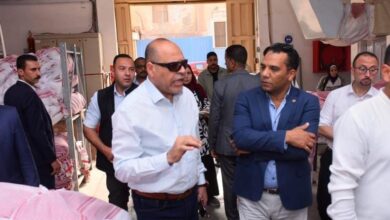President of the state-controlled Egyptian Trade Union Federation (ETUF) Hussein Megawer issued formal criterion last Saturday for candidates to run as "labor representatives" in the upcoming parliamentary elections. And the issuance has spurred debate seemingly ready to surface for some time now.
Critics of the federation's classification system argue the criterion safeguards National Democratic Party (NDP) parliamentary seats, while sidelining opposition and independent candidates.
Megawer's guidelines state a parliamentary candidate must be a member of one of the ETUF's 24 General Unions – and to have paid union dues for at least one year. Those non-union workers, who wish to be considered "labor representatives," must be registered members of social insurance plans for at least three years.
"Labor-representatives", the guidelines continue, must not be land-owners or part-time businessmen. Land-owners fall under the category "Farmer-representatives", a status determined by Ministry of Agriculture affiliates.
According to Article 87 of the Egyptian Constitution, at least 50 percent of the People's Assembly must be workers and farmers elected by direct public balloting. This article was added to the constitution during Nasser's tenure as president. But, some argue, there have been systematic attempts to manipulate the quota system.
According to Megawer, "there are ongoing attempts to penetrate the union structure by individuals and elements who do not belong within it. These elements may seek to take advantage of the union structure for their own personal gain, or for any other reasons which do not serve the public interest."
According to the director of the independent Center for Trade Union and Workers' Services, Kamal Abbas, Egypt's national constitution mandates workers be elected in order to receive eligibility consideration for union councils or parliament membership. "Megawer, however, was appointed by the government to this post in April 2006. He was not elected, and thus he should not be considered a labor representative," said Abbas.
Moreover, Megawer is a serving member of parliament from the ruling National Democratic Party, "and thus he has vested interests in terms of his party loyalty," Abbas added.
Abbas explained that the ETUF is not an independent body, but rather a state, NDP-controlled institution. Therefore, the ETUF, Egypt's sole confederation of labor unions, should not have the power to determine candidate eligibility for parliamentary elections. This, according to Abbas, represents a blatant case of governmental influential over elections. And the improprieties do not rest there.
"The ETUF has actually granted a number of businessmen and retired officers, from the ruling party, the status of labor representatives when they are not laborers in any way shape or form," said Abbas.
A former steel factory worker, Abbas unsuccessfully nominated himself in the 2000 parliamentary elections as an independent "labor representative" for the Helwan district. He explained that his General Union for Mineral, Electrical, and Engineering Industries, had initially refused to grant him "labor representative" status. In the end, he received the status "following a long and exhausting struggle with the general union council," Abbas said.
But some dismiss accusations of impeding the nomination process as erroneous. "The ETUF does not discriminate against any candidate on the basis of party affiliations, political tendencies, religion, or gender," an ETUF official, who requested anonymity, told Al-Masry Al-Youm. There are five million members in the ETUF out of Egypt's 24 million workers, the official said, and non-union workers are eligible if they fit the criterion.
Members of the general union councils, however, are selected through an indirect system of elections. But in April 2009, the Independent Union for Real Estate Tax Authority (RETA) was established as the first independent union since 1957.
"I cannot comment as to the eligibility of nominations from members of the so-called independent union of employees in the Real Estate Tax Authority, but in any case they may nominate themselves as farmer-representatives or non-workers, if applicable," the anonymous ETUF official added.
RETA Union President, Kamal Abu Eita, a member of the Nasserist Karama Party, told Al-Masry Al-Youm that apart from this independent entity Egypt boasts no genuine labor unions. A few members of his independent union sought to nominate themselves as "labor representatives" in the Shura Council elections in May 2010, he added, but all candidacies and nominations were denied.
"I don't know if any of our union members will nominate themselves to the upcoming parliamentary elections, but if any member decides to nominate his or herself, and is denied clearance from the ETUF, then we will take the case to the courts," Abu Eita added. ”Megawer's guidelines aim at keeping opposition and independent elements outside parliament, while keeping the ruling party's so-called labor representatives inside parliament."
Political reform advocate and former International Atomic Energy Agency Head Mohamed ElBaradei argues for the elimination of the 50 percent quota for workers and farmers in parliament altogether, on the basis that it is unrepresentative. "Workers complain bitterly about their fake representation in parliament with senior managers masquerading as workers," he wrote on his Twitter account.
But Muslim Brotherhood MP Essam Mokhtar, a "labor representative", disagrees. Maintaining the quota, according to Moktar, is of great importance. “Although MPs representing businessmen may have more influence and political weight, the MPs representing workers and farmers are not marginalized in parliament,” Mokhtar said. “The MPs representing workers and farmers usually tend be closer to the concerns of the general populace and the simple folk.”




